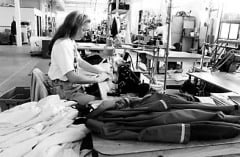
Eugene parade in 1988
(Photos: Patricia Marshall)
Eugene-based Burley flourished as a worker owned cooperative for nearly 30 years. They were a shining example of how an American company could succeed in the market even with a democratic, values-based business approach and by manufacturing their own products.
Then in 2006, Burley co-op members decided to sell the company to a single investor. The run was over. And, from what I heard from industry sources at the time, it didn’t end smoothly. So, what exactly killed the Burley Co-op? Sociologist Joel Schoening might have the answer.

Schoening has exhaustively researched the history of Burley and has conducted numerous interviews with past co-op members for an article recently published in Oregon Historical Quarterly. Schoening’s work gives us a fascinating look into what made Burley tick, what led to their dramatic change in business culture, and what led, ultimately, to the demise of their cooperative structure.
According to Schoening, Burley suffered from a mix of forces. One of them was a change in company culture:
“The vibrant democracy and commitment to social causes that once characterized Burley had eroded. The core commitment of the membership had changed from putting democracy and social causes in front of the business to putting the financial needs of the business first. Even an interest in bicycles was no longer enough to unify cooperative members.”
Added to that problem, says Schoening, was increased competition, falling market share, and lower revenues. The combination of a changing culture and these business challenges are what ultimately led to the end of the Burley Co-op.
What happened at Burley is a fascinating case study about the challenges of running a values-based, democratic organization that can still compete in today’s markets. Read the full article in Oregon Historical Quarterly.
In February, Schoening and former Burley co-op worker/owner Patricia Marshall will give a free presentation about Burley’s history. The event is part of the monthly “History Pub” program hosted by McMenamin’s Kennedy School.
History of Burley Design Cooperative
Monday, February 28, 7:00 p.m.
Theater at the Kennedy School (5736 Northeast 33rd Ave in Portland)
Free (donations to Oregon Food Bank accepted)







Thanks for reading.
BikePortland has served this community with independent community journalism since 2005. We rely on subscriptions from readers like you to survive. Your financial support is vital in keeping this valuable resource alive and well.
Please subscribe today to strengthen and expand our work.
The day I found out they were going out of business, I found and bought a Burley jacket and rain pants; they’re still great!
I wore Burley Rain Coats pretty much exclusively 1987 until 2006. If I wasn’t wearing a Burley, it wasn’t raining…
I think the last one I wore must have been made in 2004 or so.
I switched however, to custom rain coats by Dr. Doom (Steve Fasbinder).
I would LOVE to see a US made rain jacket again. a brand here locally says it cant be done, but after the Bike Craft fair I have to believe someone can do it. Tell Chris King, Paul Components, Voler Clothing, White Ind and many others you can manuf in the US! Im actively looking for a nice US made rain jacket to buy and sell at our shop if anyone cares to rise to the calling. The rain wear is not why Burley went under….
A co-op sells out to a single investor and people wonder why they collapsed? Maybe it was because they sold a co-op to a single investor.
I lived in Eugene during most of the history of Burley and had several friends who worked there. I just read the entire article linked to the BikePortland piece. I am not an expert in the demise of Burley, but the article seems to align pretty well with what I remember hearing from friends who were Burley employees. By the time the single investor got involved, the Burley co-operative concept had already failed in a business sense. One of the almost universal truths in the bike industry is that you almost have to go off-shore to remain competitive once a product becomes a ‘commodity’, as their trailer did in the late 90’s. The employees would have had to vote to eliminate their jobs in order to go off-shore. Not likely.
The cooperative ended in June, 2006, when the members voted to dissolve and become a corporation. The company was sold in September of that same year.
On another note, I was a huge fan of Yakima, but found out its owned by a Chinese company. With all this talk about buying local, even local companies seems to be not so local anymore. RIP (co-op) Burley.
J&G Cyclewear is making raingear down in Eugene. I bought new jacket and pants this fall and so far has been great (daily commuting). Very quick shipping too… http://www.bicycleclothing.com/index.html
It is certainly possible to manufacture cycling clothing in Portland – as we are doing just that at Wabi Woolens – but whether or not it is profitable enough to be sustainable in the long run remains to be seen. Labor is just one facet of the business, a company also requires an efficient infrastructure that enables access to the necessary materials to compete with Asian-produced goods. Sourcing modern and/or obscure items and materials, especially fabrics and trims, can be a challenge to do domestically and minimums are often prohibitively high.
I think there’s definitely a market here for products that *don’t* compete with Asia – i.e. durable products that retain waterproofing for more than one season. I certainly am willing to pay the additional cost if I can get something that won’t fall apart or leak after 20-30 uses.
Uh, just a grammar tip: the headline should read “A historical perspective.” Please correct. Thanks, Ch.
Thanks for posting this. It’s flattering to know that people are reading my work! Burley fans, come to the History Pub in February!
Joel Schoening
Looking forward to attending. Did your research with bike makers and cooperatives lead you to the massive Mondragon cooperative which produces Orbea bikes? By coincidence I submitted my research proposal for my own senior thesis just last night- it’s on the culture of bike racing in the Northwest.
I’m familiar with Mondragon and have followed that network of cooperatives for a long time but no, I didn’t conduct any of my own original research on it. If you are interested in Mondragon, you might be interested to know that just a few months ago, representatives from Mondragon began working with the United Steel workers to bring more cooperative development to the U.S.
I was saddened — but not at all surprised — when Burley became a sole proprietorship.
One of the earmarks of successful cooperative structures is their smaller size. (Consensus among a dozen people is easier to achieve than consensus among a hundred or more.) A cooperative that grows too big to gain workable consensus — and to enjoy a sense of commonality of goals — is a cooperative that will have problems.
Add to this Burley’s attempts to reach out on a larger, more global scale at a time when globalization of the marketplace was really impacting small manufacturers in fair-wage countries — and compounded by Westerners’ demand for cheap stuff — and you had a textbook recipe for Burley’s demise as a cooperative. There were other factors, of course, that were specific to Burley’s structure (especially regarding disbursement of shares of stock in the company, and the inability to attract new talent with an egalitarian wage scale); but by and large Burley continues to serve as a cautionary example of how to control growth, rather than letting growth control a company.
Another challenge for cooperatives, particularly in this country, is the cultural difference between Europeans and Americans. A very large cooperative like Mondragon would never work here because Americans don’t understand “solidarity” in quite the same way that many Europeans do. Mondragon works in part because of a sense of deep emotional, historical and socio-political solidarity that any American cooperative would be hard-pressed to emulate. American co-ops need other compelling reasons to stick together and work for a common good; and by and large the more successful co-ops here tend to be smaller in size and structure. For those reasons, I think comparing Mondragon to American cooperatives is more like apples and oranges, because Americans are already working within a different paradigm historically, politically and socially.
I look forward to this presentation in February and I’ll definitely urge my friends and co-workers to go.
Thanks for such a substantive and thoughtful reply Beth. I’ve often wondered why the cooperative model is not more commonplace here- with a few notable exceptions like NW based REI and Oregon based NORPAC (an agricultural coop).
REI is not a coop, and hasn’t been for some years.
“REI is not a publicly traded company, but a consumer cooperative.“
I own and use a wonderful pair of Burley wool leg warmers that I bought in the mid-1980’s, when Burley Co-op was still in Cottage Grove. Quality that lasts was what I was looking for, it’s what I got.
When Burley started to manufacture tandem and recumbent bicycles in Eugene I began to worry about their future. When they went full tilt into four models of steel single bikes I just knew the end was near. On a business call at Burley I entered the factory floor and inventory was everywhere, tubes, half finished frames and finished goods stacked to the rafters. Game over dudes!
I have to say that the man who bought the company at the very end is a great guy, and is sincerely trying to save the brand and what employees he could. With his success in other business ventures, I don’t see that he is just in it to make a buck, but there to keep the company working.
For those still looking for Burley Rain gear… To wear or take a measurement off of…I saw several well used yellow rain jackets in the Andy & Bax used gear basement last week.
beth h,
You have some thoughtful insights and much of your thinking is substantiated by my research. However, I’d like to point out a couple things.
First, the Basque region of Spain from which Mondragon originates has always been fiercely independent and has a unique culture of its own (as do many regions/nations/ethnicities of Europe). So, I don’t think it’s fair to make comparisons between U.S. and “European” attitudes about solidarity (if such a thing exists) and the associated potential of large cooperatives to operate in the U.S.. Additionally, the Mondragon network of cooperatives is a global operation with many branches and has had significant struggles maintaining some sense of solidarity even among its own members.
Also, though the individualist culture in the U.S. is certainly one barrier for cooperatives, the realities of the U.S. financial and legal systems present at least as many, if not more, barriers to cooperative growth.
Finally, though size does pose problems for cooperatives, especially those based on a set of values or moral principles (like Burley), not all cooperatives in the States are values based, and these, I argue, don’t face the same problems with size/growth/membership.
JS
JS: I think that any business where multiple owners agree to work cooperatively in an egalitarian structure must by definition be at least partly a values-based enterprise; otherwise why would Americans, steeped as we are in our historically individualistic psyches, agree to work cooperatively in an economic climate where notions of “being your own boss” and “getting as much as you can for yourself” are deeply rooted individual values, drilled into our heads by education and advertising?
Further, as your paper suggests more than once, a lack of diversity may well be precisely what helps a values-based cooperative to be successful; impose an artificial standard of “diversity” (of age, gender, race, professional experience, political and/or ethical views) on any group of people and see how much harder it becomes to achieve functional consensus.
I would say that a smaller size allows a cooperative business to do two things: a. It allows that group to cross-train all workers, in turn giving the business time to more carefully select new hires based on shared values and more time to train them to work effectively within a cooperative culture; and b. it allows the company to be more flexible and agile in its fiscal management and business practices, especially in times of financial and/or political volatility. Keeping things smaller also diminishes the likelihood of a scenario like the one that played out at Burley when they were compelled to make so many new hires into new owners pretty quickly (as a result of growth they were unprepared for), and thereby changed the balance of the values system in place.
Full disclosure: I’m a co-owner in a cooperatively-run business where I have worked for over 15 years. While working cooperatively definitely has its challenges, I’d be hard pressed to *choose* to work in a traditionally hierarchical structure again. Working cooperatively requires — and fosters — clearer and more honest communication, patience, flexibility, generosity of spirit and resourcefulness in ways I never experienced in a traditionally hierarchical business. I think working in a cooperative has helped to make me a more thoughtful human being, and has virtually guaranteed that I will not spend the rest of my life simply watching the clock — or my navel.
Beth,
Most people don’t have the time, patience, or commitment for consensus for direct democracy (partially for the education/advertising reasons you mention above). Does this mean that there is no room for them in a democratic economy? I’d like to think not.
I agree, small size and homogeneous value systems are great assets for cooperatives and have been key ingredients in cooperative success in the U.S., especially since the 1970s. I’m not convinced however, that this is the only way that cooperatives can be successful in this country. There are a growing number of examples (see the Evergreen model, or Cooperative Home Care) of cooperative development that focuses more on the business side of cooperatives in the hopes that a large firm can still be democratic and offer economic democracy and security to those of all ideological positions.
Personally, I’m a big fan of cooperatives as little bastions of far left politics, but I’m an even bigger fan of economic democracy writ large, and it won’t reach everybody unless the cooperative movement figures out how to make cooperatives work on a large scale and for those that don’t care about politics or social change.
I’d be happy to continue this conversation, but perhaps we should take it off the bikeportland comments? A colleague of your also wrote me directly. Perhaps I’ll drop by the shop.
Best,
JS
Sounda great, JS. Please do. And thanks.
A textile designer I met shared with me that a key piece to keeping American textiles alive is defense spending. Much of the demand is from military consumption and this provides a base for domestic producers and manufacturers. Without defense spending on textiles in the US all of the industry would head overseas. It was interesting to hear, coming from a boutique backpack maker – but an interesting part of the economic structure that leads companies to stay here or go overseas.
Found one of their trailers being thrown away. Just fitting wheels to it, which isn’t hard because these trailers take normal bicycle wheels, unlike the new ones. Saw on the tag “Made in Eugene, Oregon”. Was curious about the company, as you rarely see things like that US made these days. Shame they went under. Still, a very interesting history.
Is this discussion still open?